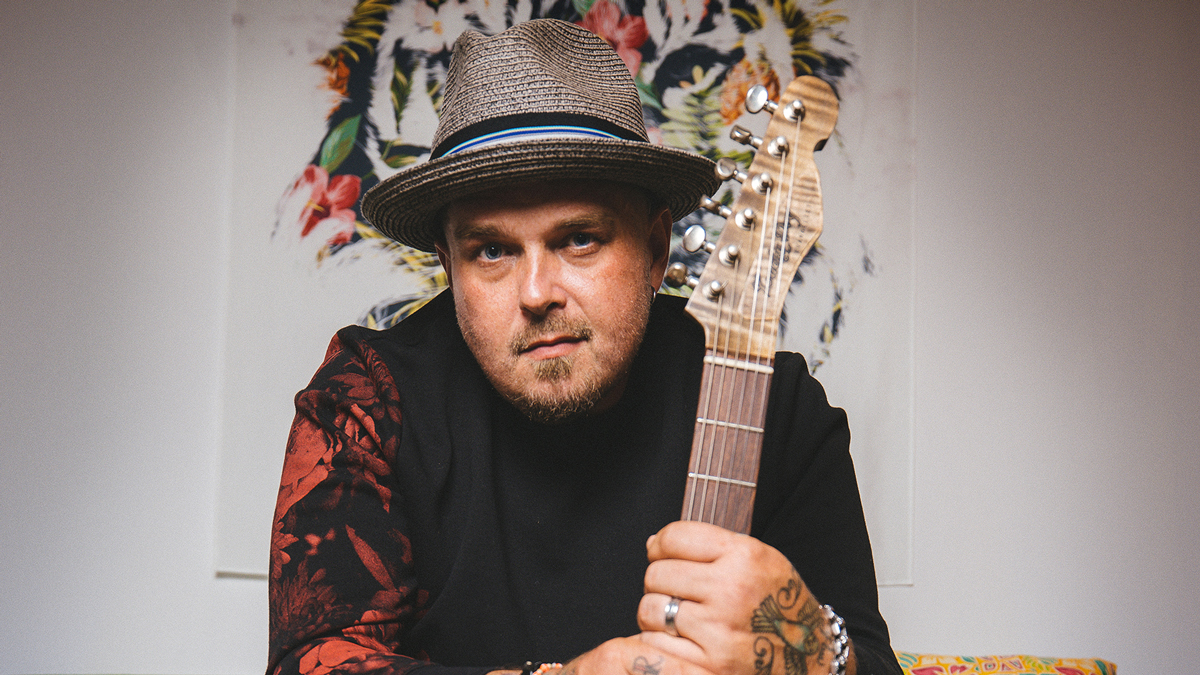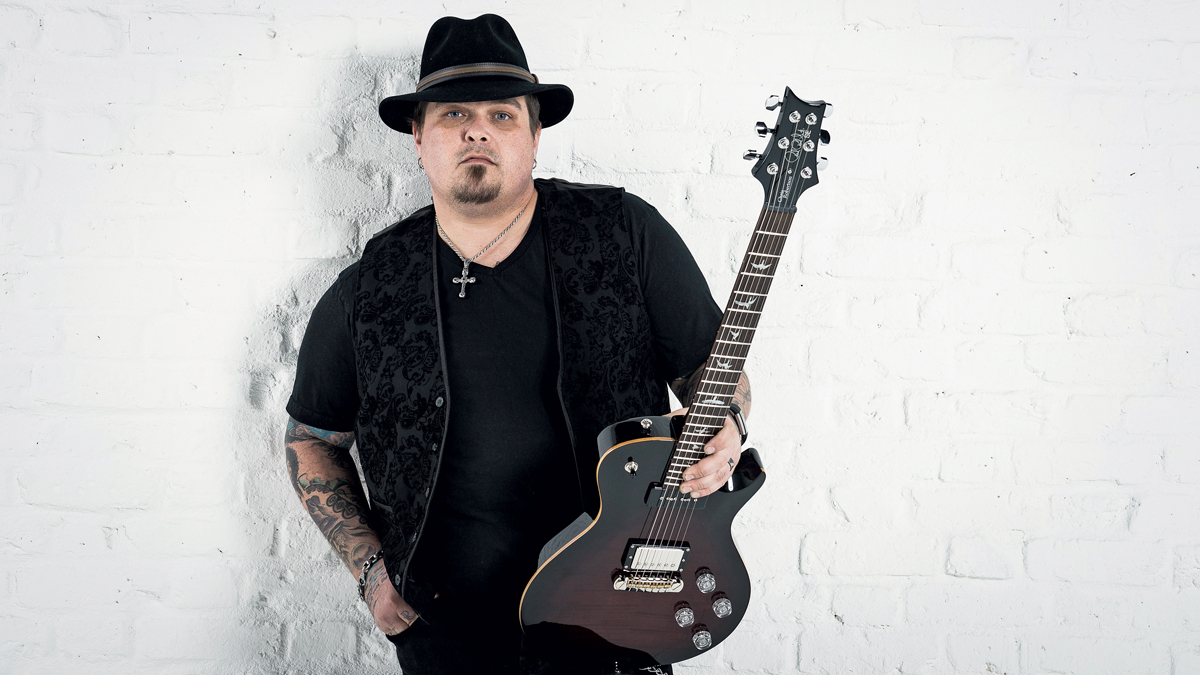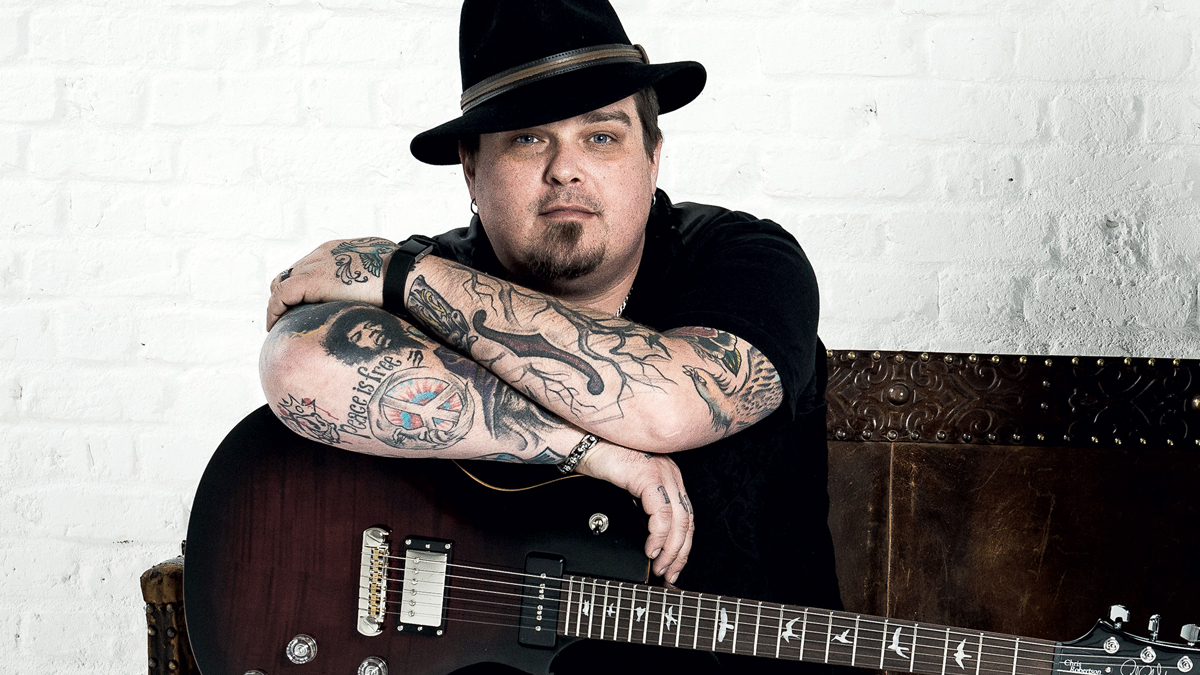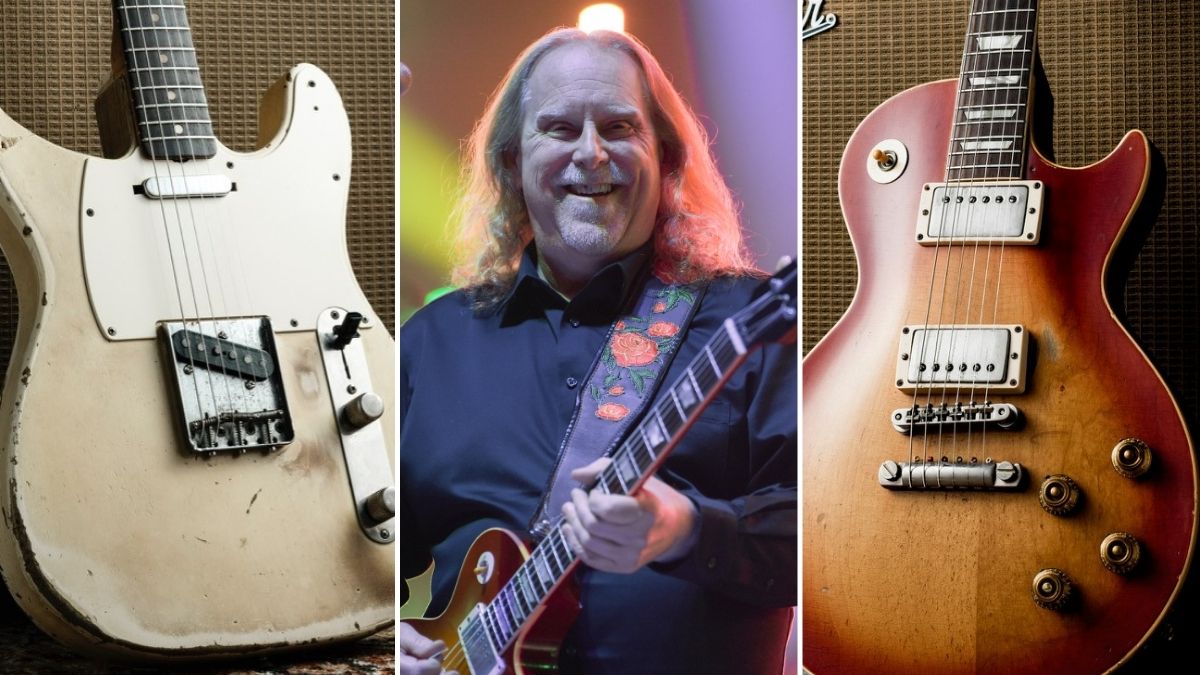Chris Robertson: "For me, 'self-medicating' always meant sitting down with a guitar, but it got to where that didn't do it for me anymore"
The Black Stone Cherry frontman speaks about his struggles with depression and how it affected his career, and why it's so important to break the stigma surrounding mental health

Starting with Mental Health Awareness month and continuing throughout the months that follow, Guitar World is hosting a series of interviews and features with artists addressing and raising awareness around themes of mental health, particularly as they relate to musicians.
“It started when I was a kid – little things that always bothered me, and things I can't even remember now. When the breaking point hit, it was from years and years of not dealing with stuff I should have dealt with.
“But that's the society we live in. I was born in 1985 and I grew up in a small town in the South, where it was 'manly men' and 'dudes are supposed to be tough'. You take a lot, hold it in, and harbor it. Whether it was stuff at home or at school, any kind of struggles, things not being great, I pushed it all aside and went on to the next thing, because that’s what’s expected of you. You think, 'Well, I'm over that. I got past it.' But that doesn't work for everyone, and it didn't work for me.
“Depression can happen to anyone. It doesn’t care your age, gender, race, religion, anything. It’s an illness like any other. I remember being 14 years old, looking at my dad's gun sitting on the wall, and thinking, 'I wonder if I shot myself if anybody would even fucking care.' I remember thinking that so many times at 14 years old. At 14.
“One of the reasons I'm so vocal about it now is because there's such a bullshit stigma around mental health and especially in men, and I’d rather people hear the truth than my try to sugarcoat it. If I can help one person, then why not be honest about the situation?
“There's a band called The Josephines that I highly recommend. They just put out a record and one of the songs [Sarah's Lincoln] says, 'Big strong men, we ain't supposed to cry, but it's all I can do to wipe tears from my eyes.' That's one of the most brutally honest lyrics ever, because we're not supposed to do that. I let it build up for so long that I finally got to a point where I couldn't contain anything anymore.
“Some of it seems so small, but when people at record labels say, 'You’re going to need to lose 25 pounds, or I don't think this band can be successful,' those little things stick with you and you always wonder, 'Was that guy right? Was my being overweight the reason we didn't get that record deal?' But again you push it aside, and it festers in the back of your mind with everything else until you break down.
All the latest guitar news, interviews, lessons, reviews, deals and more, direct to your inbox!
“I wouldn't tell anyone how I felt until I couldn't take it anymore. Your fuse may be pretty long to start with, but it gets whittled away, and anytime there's a spark lit after that, it's an explosion. I got to the point where I had no fuse left, and there's no life in that whatsoever.
“My wife, Ashley, is an absolute saint. We've been together since my 16th birthday, and I'll be 36 this year. I was going through all of this and she never left my side. The support system I had was pretty amazing. I was given space when I needed it and told to take space when I didn't know I needed it.
The thing that was killing me was we would do something with the music and there would always be a comment about my weight
“At the end of the day, whether I agreed with the things that people were telling me or not, I see now that it was all for my betterment, because those people cared enough to tell me, 'You're not doing this the right way. You need to try to figure out how to how to fix yourself.' I'm so grateful, because I got to a point where I was upset all the time, mostly at myself, but I couldn't figure out why.
“No matter what, I felt like nothing I could ever do was going to be good enough. My whole thing was self-worth. I came from a household where it didn't work out between my parents. I’m the oldest of three; I have a younger brother and a younger sister, and I felt like I let them down when my parents got divorced.
“In the midst of this, Black Stone Cherry was trying to get a record deal. We started getting a little bit of interest here and there – record labels, radio, people that booked shows, stuff that like that. We worked with this one group of people and it was an incredible learning experience, but looking back, there's no way we would have allowed ourselves now to be in the situations we were in back then. But we were kids and we were ready to do anything to get a deal. The thing that was killing me was we would do something with the music and there would always be a comment about my weight.
“I’ve always been a bigger dude, and at that point I weighed around 215 pounds. My thing was always, 'Why can’t we just focus on the music? Nobody can see me through the radio, so why does it matter?' Those are little things you think wouldn't bother somebody, but when you're the guy they’re saying it about, our hopes and dreams are riding on all these things, one of those things is how much you weigh – you do all you can, but you can't lose as much weight as they want you to, and when you play for them, they decide to pass, you don't know if it's because you don't look right or because they don't hear it in the songs. But, once again, you push it to the side.

“We moved on, got our management deal, our record deal, and things were going great. We were on the radio, we had songs in video games and movies, and we were touring. Our second record, Folklore and Superstition, came out, and then the industry started shifting to 360 deals and a whirlwind of concerns other than the music, but we got past that, too.
“Between the end of touring Folklore and Superstition and the beginning of touring Between the Devil and the Deep Blue Sea, somewhere right before 2011, something in me popped. I can't tell you exactly when it happened or what triggered it. I don't know. But something changed, and I didn't want to continue to live in the life I had anymore. And … [pauses] … it's hard to talk about, but I'm here, and I'm very thankful and grateful for that.
“I was on my way to my truck, with my gun, and I was going to end it. The thoughts in my head were very calm: 'Go ahead. Nobody's going to fucking care.' It was a calming thought, and that’s what’s scary to me. I remember that calm. I got a couple steps from my truck and it was like a lightning bolt hit me. That was the wakeup, that was the shock, like it was God saying, 'Stop! Not now.' I thought, 'What the fuck am I doing?' I started bawling and went back inside. I sold the gun and the truck.
The day our third record comes out, I'm in a psychiatrist's office, explaining to him that I don’t want to be alive anymore
“Between the Devil and the Deep Blue Sea came out on May 31, 2011, and that morning I sat in a psychiatrist’s office for a few hours. Third record and our band is doing great. We're not making a lot of money, but we're getting by; everybody's been able to finally get their own place, whether they're renting or bought a small house. Everything's going good. Ashley and I are getting married in December. And here I am, the day the record comes out, in a psychiatrist's office, explaining to him that I don’t want to be alive anymore.
“It sounds so stereotypical, but I went into this office, signed in, sat down, and watched the fish in the fish tank until they called my name to come back. I was really nervous, really timid. I was terrified to talk to this doctor, but he asked me a couple of questions, and then all at once it was like an open book. Things I held on to for who knows how many years, things that happened when I was four and five years old that I have finally come to terms with, all of that had accumulated.
“When I left, Ashley drove us to a gas station, I got something to drink, and then we went to Walmart, where the band did an in-store signing and an acoustic session for our album release. There are pictures of it, and you can see on my face that I was in such a whirlwind of emotions. I didn't know exactly how to feel when I left his office, but I knew that I felt lighter. I knew that I felt like I could actually breathe a little bit.
“That's not to say that times didn't come in the months following where it got worse again. That's the thing. I'm okay with the fact that I’ve got to take medicine every day for the rest of my life. I'm totally fine with that. Doesn't bother me a bit. I've had high blood pressure since I was 16 years old and I take medicine for that every morning. What's wrong with taking medicine that also helps balance me out a little bit? Not a damned thing.
“But what I struggle with is having to change my medicine or have the dosage upped. I get aggravated because I'm like, 'Dammit, when is it ever just going to be okay, like, here we go, this is the one?' Ashley is a nurse, and she’ll remind me that it doesn't work that way for everyone, so just keep doing what I’m doing. I'm so thankful for that support.
“You know, you can have everything going for you and nothing be right at the same time. It's so hard to describe or explain the way it feels. It’s like walking barefoot through a desert of razor blades, glass, and alcohol, and every step you take cuts a little bit deeper until you’re numb and don’t give a fuck anymore. The only thing I can say is that my worst enemy, the person that would wish me death, I truly would not wish what I went through on that person. I wouldn't wish it upon anybody. Nobody.
“For me, 'self-medicating' always meant sitting down with a guitar, but it got to where that didn't do it for me anymore. None of the things I truly loved were doing it for me anymore. I was going through the motions, even onstage. There were nights that I loved every minute of it and nights that I was just getting through the show. And that sucks, man. There were nights like that even after I found professional help.
“Unfortunately, addiction runs in my family, and some of the medication I was on, narcotics, I got to abusing it pretty heavily. At first it was amazing, because when I started to feel those panic attacks where I’d gasp for breath and cry because I couldn’t talk, I liked how the medicine made me feel.
“Then I started to like how it felt all the time, and I abused it pretty damned bad, so much so that I can remember certain things, but there's whole tours that if you were to ask me if I remembered playing a song at a show one night, I probably would have to look up a YouTube video before it would click with me. Those medications are extremely helpful in certain instances, if you take it the way it's supposed to be taken, but man, they are so awful if you have an addictive personality, like I do.

“I will say this: nobody in my circle walked out on me. The one thing they did that I am forever grateful for was they told me that things had to change. The reason I'm so thankful is because you're only going to help yourself at your fullest capacity when you're the only thing you've got. It’s true that you never know how strong you are until being strong is the only option you have.
If you know someone who is struggling – a friend, a family member, anyone – please look at them with softer eyes
“I understand that people come and go, and I'm okay with that. It's a part of life, and there's nothing wrong with that. But for anyone who's going through this and you feel like the people that love you the most aren’t there for you, chances are they're showing you that you've got to make a change, because you can only help someone if they're going to help themselves.
“If you feel like everyone is walking out on you, please evaluate it and make sure you're doing everything you can as well. The only time that I helped myself more than ever was when I felt like I was all I had, and if that hadn’t happened, I don’t know if I would have tried as hard. It was die or don’t, and I was halfway there. But I'm still here, and I'm forever grateful for everything and every opportunity that I get.
“If you are reading this and you are struggling, please, if you can get professional help, I strongly, highly recommend it. It was a massive turning point for me. Please look into every available option. If you know someone who is struggling – a friend, a family member, anyone – please look at them with softer eyes. Be there for them. Be an ear. Set boundaries for yourself – you have to – but try to be more tender. Life is entirely too short. Let’s love each other more in the way that little children do, without judging. If we could all just try that, we could do so much better for each other.”
– As told to Alison Richter
Mental health resources
Alison Richter is a seasoned journalist who interviews musicians, producers, engineers, and other industry professionals, and covers mental health issues for GuitarWorld.com. Writing credits include a wide range of publications, including GuitarWorld.com, MusicRadar.com, Bass Player, TNAG Connoisseur, Reverb, Music Industry News, Acoustic, Drummer, Guitar.com, Gearphoria, She Shreds, Guitar Girl, and Collectible Guitar.
